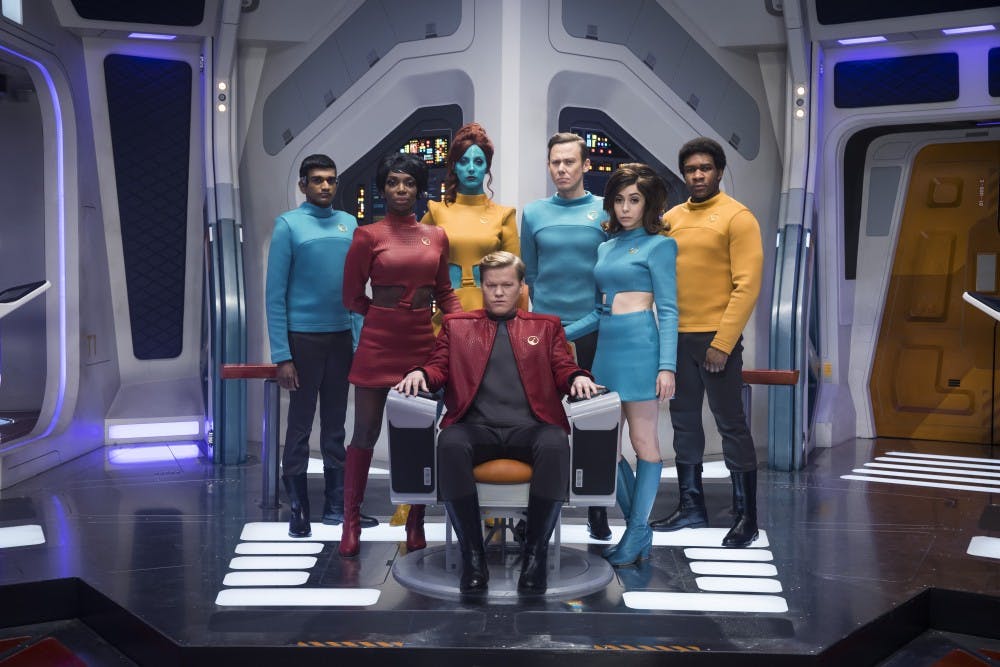Star Trek fans are something of a dying breed. Compared to its somewhat sci–fi rival Star Wars, it is losing its popularity: according to a Forbes survey, 46% of people stated that they preferred Wars, while only 14% voted for Trek. Despite its similar, consistent release of films on–par with the third trilogy of Star Wars films, the latter earned almost one billion more in the box office compared to the latest Trek film. That doesn’t mean that Star Trek–related things are dying out, though. Television like The Simpsons and The Big Bang Theory rely on classic “nerd” references to Star Trek just as much as Star Wars. The debates over which is better are something of a cultural staple in the discussion of sci–fi. It seems that Star Trek references are more popular than the content itself. However, not all references get the show right for fans.
A recent episode of the series Black Mirror, "USS Callister," rests on allusions to Star Trek throughout. The plastic white of the bridge, the specific coloring of the clothing, and the styling of the characters is explicitly calling back to whatever the audience has seen of Star Trek: The Original Series and the reboot films. "USS Callister" doesn’t simply reference such content: it relies on it.
This first scene is brilliant and easily the best in the episode. Everything from the sound design to the set to the camera used is reminiscent of the original Star Trek. While first watching it, I was filled with a giddy kind of glee, assuming that it would be a critique of Gene Roddenberry's original work and the privileged heterosexual white male nerd spin of it. I think I’m supposed to feel this glee at the idea of this perfected and professional recreation of the classic work, only with a new spin. This is how the episode had been pitched to me in the first place by a friend: poking fun at those fanboys who misinterpret the show.
This, as it turns out, was not the point of the episode.
Even within the first scene (perfectly acted and filmed), one believes that the whole episode is going to be a subjective retelling of the original series, biased by the modern fan’s projections of toxic masculinity, etc. We know, of course, that crewmen never fell to Kirk’s feet begging for forgiveness, nor did they do three cheers for him just before the credits rolled, nor did each of the women of the bridge crew approach our fearless captain for the sake of a closed–mouth, deep–dipping kiss. This is a certain fanboy’s image of what Star Trek is, which is wrong. This is perfect: if the episode had continued with this throughout, examining how some misinterpret a genius piece of work, then I would’ve thought it deserved its Emmys. But it wasn’t.
Star Trek, of course, has its faults. But "USS Callister" almost goes too far in its critique: it extends past just the privileged men who obsess over it and turns to the show itself. A show that can breed an obsessive, creepy, often abusive fan base likely has some faults in itself. But similar shows like Rick and Morty have a deeper layer of meaning than most people give it credit for, and Star Trek is in the same boat. The blame is not entirely on the show.
Star Trek: The Original Series aired in 1966. The civil rights movement was still in full swing. The cast is made up of four white men (one from Russia and another from Scotland), a Japanese man, a black woman, and a half–human, half–Vulcan first officer played by a Jewish man. To a modern perspective, this seems like the bare minimum (which even modern shows still fail to reach). In the 1960s, this was revolutionary.
Taking Star Trek out of its historical context is partly why it is so easily skewed. This is exactly what makes it nearly impossible in a modern world of film critique to praise older pieces like Star Trek: because they’re sci–fi and because they’re mockable for other very legitimate reasons (such as the short women’s outfits, the shallow plots, and the really god–awful way they kiss). Things like Star Wars and Star Trek are either only seen as untouchable pieces of holy artwork or outdated pieces with no value today, when in reality, they lie somewhere in the middle.
"USS Callister" exists as more than just a critique of Star Trek, but it does rely on cultural knowledge of the original television series. The majority of the references are valid critiques—the too–short outfits for women, the subtle racism, the cheap villains—but critics have unanimously praised "USS Callister" for being born out of adoration for Star Trek without acknowledging that the episode fails to ever show the value of the original series. Perhaps on a technical level, it is “an unabashed love letter to Star Trek," but not in context. We only see Trek for its faults, never its successes or its shining moments of humanity in an extensive world. This is the message of Star Trek–finding humanity in the darkest of times. And it is something we never saw in "USS Callister."

